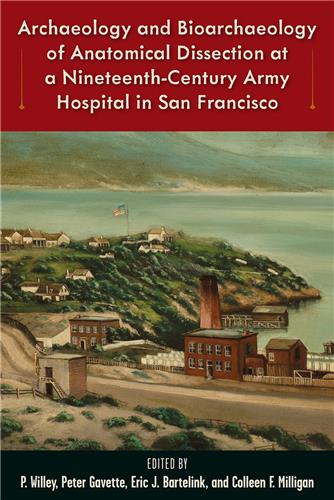This volume uses historical, archaeological, and bioarchaeological analysis to study and understand a nineteenth-century medical waste pit discovered at the former Army hospital at Point San Jose in San Francisco.
Browse by Subject: Anthropology and Archaeology
Please note that while you may order forthcoming books at any time, they will not be available for shipment until shortly before publication date
This ethnographic memoir weaves together the history of capoeira, recent transformations in the practice, and personal insights from author Katya Wesolowski’s thirty years of experience as a capoeirista.
This volume presents approaches to the archaeology of war that move beyond the forensic analysis of battlefields, fortifications, and other sites of conflict to consider the historical memory, commemoration, and social experience of war.
Through various case studies, this volume illustrates how archaeologists can use bioarchaeology, zooarchaeology, archaeobotany, architecture, and other evidence to interpret past foodways and reconstruct past social worlds.
Incorporating data from across six continents and tracing the human experience from the Late Pleistocene to the present, this volume examines transitional periods of cultural and environmental change through the lenses of archaeology and ethnography.
Through case studies of faunal remains from Roman Britain, prehistoric Southeast Asia, ancient African pastoral cultures, and beyond, this volume illustrates some of the ways stable isotope analysis of ancient animals can address key questions in human prehistory.
This is the first volume to explore the understudied side of baseball—how its heritage is understood, interpreted, commodified, and performed for various purposes today, ultimately showing how the performance of baseball heritage can reflect the culture and heritage of a nation.
In this firsthand look at the landscape of community news today, photojournalist John Pendygraft uses his own experiences to show why trusted local reporting matters now more than ever, making the case that the decline of local journalism threatens the future of democracy.
Exploring the cultural role of cycads in the ancient and modern Mesoamerican and Caribbean worlds, this volume demonstrates how these ancient plants have figured prominently in regional mythologies, rituals, art, and foodways from the Pleistocene-Holocene transition to the present.
Discussing case studies from the Pleistocene through Late Holocene periods, this volume offers a robust examination of houses as not only places of shelter but also of memory, history, and social cohesion within mobile cultures.











